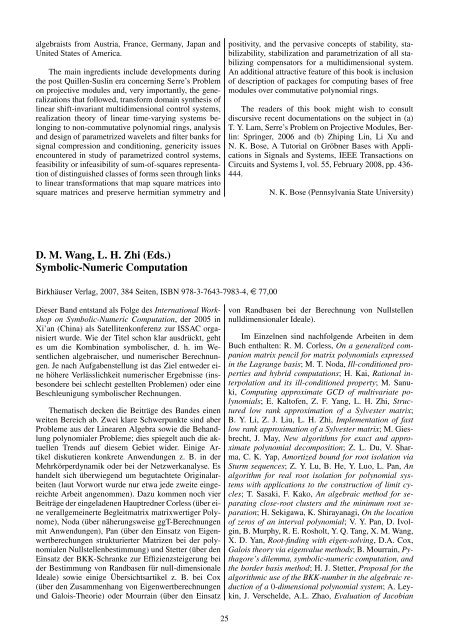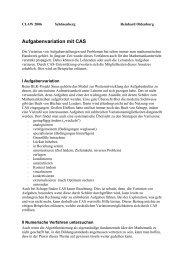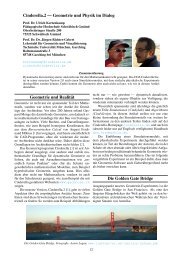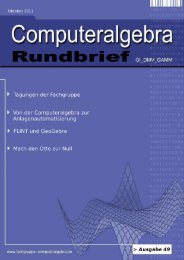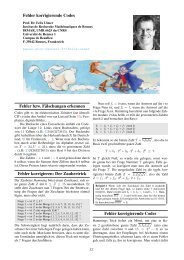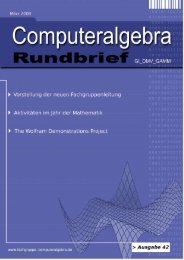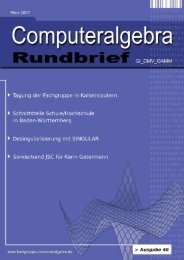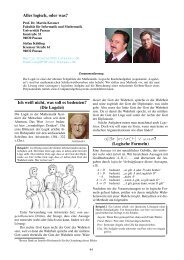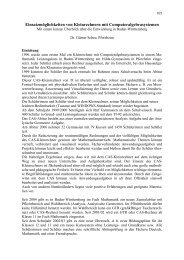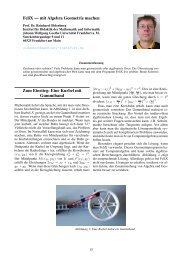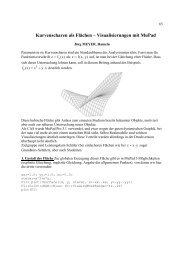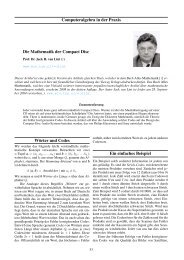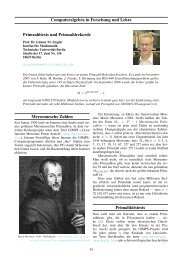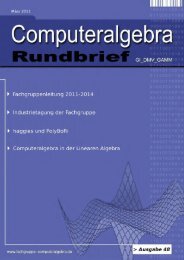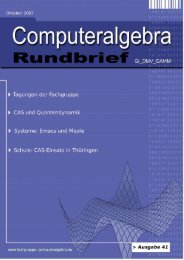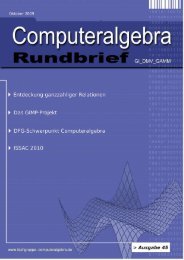Konfidenzintervalle und CAS - Fachgruppe Computeralgebra
Konfidenzintervalle und CAS - Fachgruppe Computeralgebra
Konfidenzintervalle und CAS - Fachgruppe Computeralgebra
Erfolgreiche ePaper selbst erstellen
Machen Sie aus Ihren PDF Publikationen ein blätterbares Flipbook mit unserer einzigartigen Google optimierten e-Paper Software.
algebraists from Austria, France, Germany, Japan and<br />
United States of America.<br />
The main ingredients include developments during<br />
the post Quillen-Suslin era concerning Serre’s Problem<br />
on projective modules and, very importantly, the generalizations<br />
that followed, transform domain synthesis of<br />
linear shift-invariant multidimensional control systems,<br />
realization theory of linear time-varying systems belonging<br />
to non-commutative polynomial rings, analysis<br />
and design of parametrized wavelets and filter banks for<br />
signal compression and conditioning, genericity issues<br />
encountered in study of parametrized control systems,<br />
feasibility or infeasibility of sum-of-squares representation<br />
of distinguished classes of forms seen through links<br />
to linear transformations that map square matrices into<br />
square matrices and preserve hermitian symmetry and<br />
D. M. Wang, L. H. Zhi (Eds.)<br />
Symbolic-Numeric Computation<br />
Birkhäuser Verlag, 2007, 384 Seiten, ISBN 978-3-7643-7983-4, e 77,00<br />
Dieser Band entstand als Folge des International Workshop<br />
on Symbolic-Numeric Computation, der 2005 in<br />
Xi’an (China) als Satellitenkonferenz zur ISSAC organisiert<br />
wurde. Wie der Titel schon klar ausdrückt, geht<br />
es um die Kombination symbolischer, d. h. im Wesentlichen<br />
algebraischer, <strong>und</strong> numerischer Berechnungen.<br />
Je nach Aufgabenstellung ist das Ziel entweder eine<br />
höhere Verlässlichkeit numerischer Ergebnisse (insbesondere<br />
bei schlecht gestellten Problemen) oder eine<br />
Beschleunigung symbolischer Rechnungen.<br />
Thematisch decken die Beiträge des Bandes einen<br />
weiten Bereich ab. Zwei klare Schwerpunkte sind aber<br />
Probleme aus der Linearen Algebra sowie die Behandlung<br />
polynomialer Probleme; dies spiegelt auch die aktuellen<br />
Trends auf diesem Gebiet wider. Einige Artikel<br />
diskutieren konkrete Anwendungen z. B. in der<br />
Mehrkörperdynamik oder bei der Netzwerkanalyse. Es<br />
handelt sich überwiegend um begutachtete Originalarbeiten<br />
(laut Vorwort wurde nur etwa jede zweite eingereichte<br />
Arbeit angenommen). Dazu kommen noch vier<br />
Beiträge der eingeladenen Hauptredner Corless (über eine<br />
verallgemeinerte Begleitmatrix matrixwertiger Polynome),<br />
Noda (über näherungsweise ggT-Berechnungen<br />
mit Anwendungen), Pan (über den Einsatz von Eigenwertberechungen<br />
strukturierter Matrizen bei der polynomialen<br />
Nullstellenbestimmung) <strong>und</strong> Stetter (über den<br />
Einsatz der BKK-Schranke zur Effizienzsteigerung bei<br />
der Bestimmung von Randbasen für null-dimensionale<br />
Ideale) sowie einige Übersichtsartikel z. B. bei Cox<br />
(über den Zusammenhang von Eigenwertberechnungen<br />
<strong>und</strong> Galois-Theorie) oder Mourrain (über den Einsatz<br />
25<br />
positivity, and the pervasive concepts of stability, stabilizability,<br />
stabilization and parametrization of all stabilizing<br />
compensators for a multidimensional system.<br />
An additional attractive feature of this book is inclusion<br />
of description of packages for computing bases of free<br />
modules over commutative polynomial rings.<br />
The readers of this book might wish to consult<br />
discursive recent documentations on the subject in (a)<br />
T. Y. Lam, Serre’s Problem on Projective Modules, Berlin:<br />
Springer, 2006 and (b) Zhiping Lin, Li Xu and<br />
N. K. Bose, A Tutorial on Gröbner Bases with Applications<br />
in Signals and Systems, IEEE Transactions on<br />
Circuits and Systems I, vol. 55, February 2008, pp. 436-<br />
444.<br />
N. K. Bose (Pennsylvania State University)<br />
von Randbasen bei der Berechnung von Nullstellen<br />
nulldimensionaler Ideale).<br />
Im Einzelnen sind nachfolgende Arbeiten in dem<br />
Buch enthalten: R. M. Corless, On a generalized companion<br />
matrix pencil for matrix polynomials expressed<br />
in the Lagrange basis; M. T. Noda, Ill-conditioned properties<br />
and hybrid computations; H. Kai, Rational interpolation<br />
and its ill-conditioned property; M. Sanuki,<br />
Computing approximate GCD of multivariate polynomials;<br />
E. Kaltofen, Z. F. Yang, L. H. Zhi, Structured<br />
low rank approximation of a Sylvester matrix;<br />
B. Y. Li, Z. J. Liu, L. H. Zhi, Implementation of fast<br />
low rank approximation of a Sylvester matrix; M. Giesbrecht,<br />
J. May, New algorithms for exact and approximate<br />
polynomial decomposition; Z. L. Du, V. Sharma,<br />
C. K. Yap, Amortized bo<strong>und</strong> for root isolation via<br />
Sturm sequences; Z. Y. Lu, B. He, Y. Luo, L. Pan, An<br />
algorithm for real root isolation for polynomial systems<br />
with applications to the construction of limit cycles;<br />
T. Sasaki, F. Kako, An algebraic method for separating<br />
close-root clusters and the minimum root separation;<br />
H. Sekigawa, K. Shirayanagi, On the location<br />
of zeros of an interval polynomial; V. Y. Pan, D. Ivolgin,<br />
B. Murphy, R. E. Rosholt, Y. Q. Tang, X. M. Wang,<br />
X. D. Yan, Root-finding with eigen-solving, D.A. Cox,<br />
Galois theory via eigenvalue methods; B. Mourrain, Pythagore’s<br />
dilemma, symbolic-numeric computation, and<br />
the border basis method; H. J. Stetter, Proposal for the<br />
algorithmic use of the BKK-number in the algebraic reduction<br />
of a 0-dimensional polynomial system; A. Leykin,<br />
J. Verschelde, A.L. Zhao, Evaluation of Jacobian


